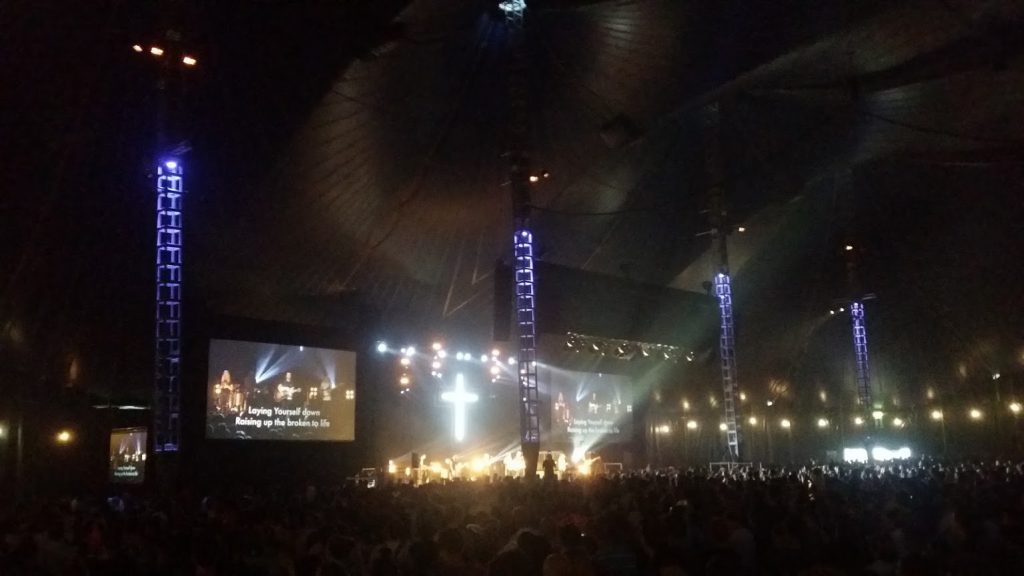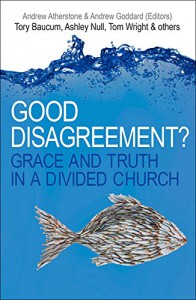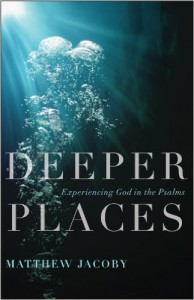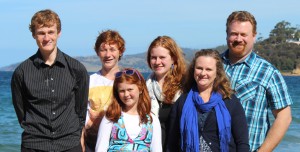Remembering Jesus: Soul Survivor and Sacramental Singing
 We’ve just been to Soul Survivor. For the uninitiated, it’s a Christian youth festival, held as five separate weeks in various places around the UK. We went to the last week in Shepton Mallet, Somerset together as a family with our church youth group and with 6,500 other people.
We’ve just been to Soul Survivor. For the uninitiated, it’s a Christian youth festival, held as five separate weeks in various places around the UK. We went to the last week in Shepton Mallet, Somerset together as a family with our church youth group and with 6,500 other people.
It was fantastic. Uplifting, moving, healing, restorative, life-giving, fun, peaceful, worshipful.
But I had an initial concern that it would be all about the hype and the froth. I had had a passing observation of Soul leader, Mike Pilavachi, and he has, shall we say, a large personality. Would the big top and the light show make it just another spiritualised buzz for young people, to dry up like the mud in the fields as the tents are pulled down and the cars drive away?
It wasn’t like that. While rightly being the centre of attention at times, Mike, when it mattered, constantly put the attention back to Jesus. He was not afraid to turn off the light show and simply ask people to pray in quietness. People weren’t asked to come forward to receive ministry from the big holy guru, but to simply to pray for and care for one another. I saw people moved with contrition, with love, with peace, with joy.
And there was music. Lots of it. Some loud, some repetitive, some light, some profound. It carried people away without getting carried away, if you know what I mean. And while the lyrics were not 18th Century theological treatises, they were meaningful and biblical.
It reprised me with an ongoing thought I’ve had about charismatic worship of this kind, the sort that’s done well. What does it do?
Firstly, it expresses an obedience to the Scriptural injunction to build one another up with “songs, hymns, and spiritual songs” and to “sing and make music from your heart to the Lord.”
Secondly, there is a sense of expectation that this form of worship is an effective means of encountering the grace of God in particular, life-giving ways. This is the charismatic sense in which the worship incorporates prayer, healing, restoration, and a growing intimacy with the Holy Spirit.
These are two marks that characterise sacraments. The two canonical Sacraments of the Lord’s Supper and Baptism are done in obedience and are an effective administration of God’s grace. We encounter God in the Sacraments, by the power of the Holy Spirit.
Musical worship is not a Sacrament, but in this sense it is sacramental. In the midst of musical worship we can encounter the grace of God in a particular way as the Holy Spirit ministers to us.
What struck me at Soul Survivor however, was another aspect of this. The two Sacraments also have the characteristic of being a memorial, in the broad sense of the word of “an aid to memory.” Jesus commands that the breaking of the bread and the pouring of the wine and the sharing together should be done “in remembrance of me.”
As I watched over six thousand young people singing about Jesus it was clear, by this they were remembering him, and they were remembering who they are in him. It was truly a memorial. It was kerygmatic. It was a connection with and a proclamation of the Way, the Truth, and the Life.
And my prayer is this: that as the young people dispersed into their year, that they would take the remembering of these songs, this worship experience, with them. In whatever stresses and strains they experience, that they would be led to remember Christ there, away from the big top, in the midst of reality. That they would do life in remembrance of him, and so bear much fruit for his glory. Amen.


 One of the most important dynamics in living churches is that of intentional one-on-one relationships that help individuals mature in their faith. We have our Sunday gathered worship times, and our small groups, and prayer triplets and things like that, but intentional personal investment is invaluable. Many of us can reflect on the individuals who have invested in us over the years, be it formally or informally; they are invariably God’s gift to us.
One of the most important dynamics in living churches is that of intentional one-on-one relationships that help individuals mature in their faith. We have our Sunday gathered worship times, and our small groups, and prayer triplets and things like that, but intentional personal investment is invaluable. Many of us can reflect on the individuals who have invested in us over the years, be it formally or informally; they are invariably God’s gift to us. I have learned that the Scottish love Scotland. And the Welsh love Wales. But do the English love England?
I have learned that the Scottish love Scotland. And the Welsh love Wales. But do the English love England?





 We are looking forward to being part of St. Nic’s as the church acts in the vision of “being good news, and bringing good news.” We have already visited the parish as part of the appointment process where we discovered a great affection for the church family, and for the town itself. We are looking forward to putting down new roots and discovering the details of God’s purpose there.
We are looking forward to being part of St. Nic’s as the church acts in the vision of “being good news, and bringing good news.” We have already visited the parish as part of the appointment process where we discovered a great affection for the church family, and for the town itself. We are looking forward to putting down new roots and discovering the details of God’s purpose there.
 In recent times many of us preachers have had our sermons recorded, turned into mp3s, and placed online. It doesn’t make us “internet preachers”, but it is the “tape ministry” of a previous decade in current form. It also means that, for better or worse, our homiletical efforts are recorded for posterity.
In recent times many of us preachers have had our sermons recorded, turned into mp3s, and placed online. It doesn’t make us “internet preachers”, but it is the “tape ministry” of a previous decade in current form. It also means that, for better or worse, our homiletical efforts are recorded for posterity.
